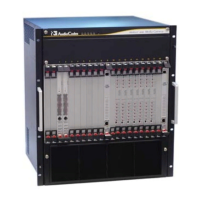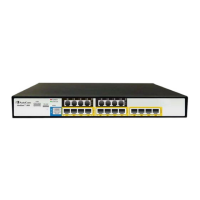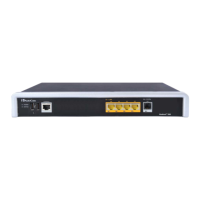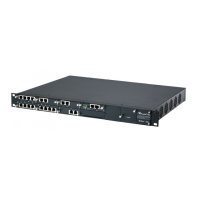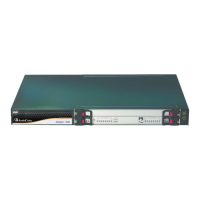CHAPTER19 Coders and Profiles
Mediant 800 Gateway & E-SBC | User's Manual
Parameter Description
Note: As ICE has been defined by the WebRTC standard
as mandatory, the support is important for deployments
implementing WebRTC. For more information on
WebRTC, see WebRTC.
'SDP Handle RTCP'
sbc-sdp-handle-rtcp
[IpProfile_
SBCSDPHandleRTCPAttribut
e]
Enables the interworking of the RTCP attribute, 'a=rtcp'
(RTCP) in the SDP, for the SIP entity associated with the
IP Profile. The RTCP attribute is used to indicate the
RTCP port for media when that port is not the next higher
port number following the RTP port specified in the media
line ('m=').
The parameter is useful for SIP entities that either require
the attribute or do not support the attribute. For example,
Google Chrome and Web RTC do not accept calls without
the RTCP attribute in the SDP. In Web RTC, Chrome
(SDES) generates the SDP with 'a=rtcp', for example:
m=audio 49170 RTP/AVP 0
a=rtcp:53020 IN IP6
2001:2345:6789:ABCD:EF01:2345:6789:ABCD
■ [0] Don't Care = (Default) The device forwards the
SDP as is without interfering in the RTCP attribute
(regardless if present or not).
■ [1] Add = The device adds the 'a=rtcp' attribute to the
outgoing SDP offer sent to the SIP entity if the attribute
was not present in the original incoming SDP offer.
■ [2] Remove = The device removes the 'a=rtcp'
attribute, if present in the incoming SDP offer received
from the other SIP entity, before sending the outgoing
SDP offer to the SIP entity.
Note: As the RTCP attribute has been defined by the
WebRTC standard as mandatory, the support is important
for deployments implementing WebRTC. For more
information on WebRTC, see WebRTC.
'RTCP Mux'
sbc-rtcp-mux
[IPProfile_SBCRTCPMux]
Enables interworking of multiplexing of RTP and RTCP
onto a single local port, between SIP entities. The
parameter enables multiplexing of RTP and RTCP traffic
onto a single local port, for the SIP entity associated with
the IP Profile.
Multiplexing of RTP data packets and RTCP packets onto
a single local UDP port is done for each RTP session
(according to RFC 5761). If multiplexing is not enabled, the
device uses different (but adjacent) ports for RTP and
RTCP packets.
With the increased use of NAT and firewalls, maintaining
multiple NAT bindings can be costly and also complicate
firewall administration since multiple ports must be opened
to allow RTP traffic. To reduce these costs and session
setup times, support for multiplexing RTP data packets
and RTCP packets onto a single port is advantageous.
- 432 -

